‘Catholic News’ is a podcast carrying interviews with a diverse range of people – lay people, religious and clergy – involved on the front line of the Catholic Church’s work in England and Wales.
17th November 2023
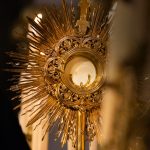
Canon Christopher Thomas, General Secretary of the Catholic Bishops’ Conference of England and Wales speaks about the Bishops’ Autumn Plenary meeting held at Hinsley Hall in Leeds from 13-16 November 2023.
He talks, in particular, about the resolutions from the meeting and is joined by Father Jan Nowotnik to discuss the longer resolution on the Synod that looks at “Steps Towards Renewal”.
On this podcast we address: Environmental concerns, the elevation of the Shrine of St Winefride, Holywell to the status of National Shrine for England and Wales. We also talk about the National Eucharistic Congress that will be held at Oscott College in September 2024, and the conflict in Gaza.
You can subscribe to our Catholic News podcasts via Apple Podcasts, Amazon/Audible or Spotify.
11th November 2023
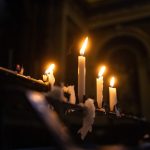
Dominican friar Fr Samuel Burke OP is a chaplain in the Royal Navy currently serving on HMS Duncan in the Mediterranean. He gave a poignant reflection on remembrance and honouring our war dead on BBC Radio 4’s Thought for the Day.
It was broadcast on 11 November, Armistice Day, known as Remembrance Day in the Commonwealth.
“If, during the two minutes of silence, the enormous shadow of grief and the haunting prospect of future loss can’t provoke each of us to rededicate ourselves to peace then, frankly, nothing will.
“Whatever else you choose to think about during the still moments later today and tomorrow, be sure to make good that solemn promise that we renew each year. We will remember them. They were not so different to us.
You can subscribe to our Catholic News podcasts via Apple Podcasts, Amazon/Audible or Spotify.
10th November 2023
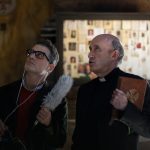
November is a very important month in the Catholic calendar. It’s the month when we pause on many occasions to remember our friends and loved ones who have died – the Holy Souls. We also remember those killed in the world’s conflicts, especially on Armistice Day and Remembrance Sunday.
For this podcast, produced in partnership with the Centre for the Art of Dying Well, we head over to South Kensington in central London to speak to Father George Bowen, a priest of the Congregation of the Oratory of St Philip Neri.
The community has a most beautiful church. Built between 1880 and 1884, the Church of the Immaculate Heart of Mary – the London Oratory – is sometimes incorrectly called the ‘Brompton Oratory’ and is the second-largest Catholic church in London, with a nave exceeding in width that of St Paul’s Cathedral. The architectural style and the atmosphere of the church were deliberately Italianate, in order to bring St Philip’s romanità to nineteenth century London.
So why are we here? Well, partly for the person and partly for this stunning place of worship. Fr George Bowen has vast experience as a hospital chaplain and has accompanied many people on their way to the Lord – Catholics and non-Catholics. As a priest and Oratorian, his stock-and-trade extends beyond what happens in the here and now – beyond this world to the eternal kingdom.
“St Paul, in his letter to the Corinthians, talks about our experience in life as if we’re living in a tent,” says Fr George. “We’re living in a temporary place and we need to fold up that tent because there’s going to be a house built for us in heaven. And in a way, when we walk into a church like this, what it reminds us of is the house which is prepared for us in the next world. It’s meant to do that, really. It’s meant to put this world into a different perspective.”
This podcast is a walk-and-talk tour of the London Oratory’s memorials, statues, confessionals, altars, beautiful works of art, and prayerful side chapels – all gateways to a life beyond this world. Prayerful places where we can focus our minds on the Holy Souls and pray for those who have gone before us.
Although we do our best to paint word pictures in your minds, we have an album of images on Flickr that accompany this podcast.
Click here to look through the photos as you listen.
The Centre for the Art of Dying Well is based at St Mary’s University. It’s founding aim is to rethink the art of accompaniment at the end of life. It focuses on public engagement, policy, and research on the subjects of death, dying and bereavement.
You can subscribe to our Catholic News podcasts via Apple Podcasts, Amazon/Audible or Spotify.
30th October 2023

Director of Policy and Research here at the Bishops’ Conference, Philip Booth, joins us to talk about our latest cost-of-living statement.
Philip is an economist who is also Professor of Finance, Public Policy and Ethics at St Mary’s University, Twickenham, as well the university’s Director of Catholic Mission.
The Bishops’ Conference statement, released by the Department for Social Justice ahead of the Government’s Autumn Statement, recognises that the cost-of-living crisis is multi-faceted and requires actions at a range of levels, including Government, civil society and the Church.
It makes a number of specific requests of the Government including the call that the taxation system should treat justly those with family and other caring responsibilities. Other requests relate to the provision and cost of housing, welfare benefits, the removal of the two-child cap on universal credit payments, and the transition to greener energy. You can read the full statement here.
Philip also discusses the preferential option for the poor that lies at the heart of Catholic life, what our network of Catholic charities are doing to alleviate poverty, the role of our parishes and schools, and how we can all we can all play a part – no matter our personal circumstances.
You can subscribe to our Catholic News podcasts via Apple Podcasts, Amazon/Audible or Spotify.
19th October 2023
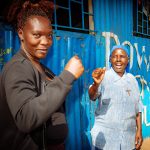
Father Anthony Chantry joins us for this Catholic News podcast to discuss World Mission Sunday. Celebrated on the penultimate Sunday of October, it’s a chance to support missionaries and the churches, hospitals and schools where they do the Lord’s work, in countries where the Church is new, young or poor.
Fr Chantry is the National Director of Missio, the Pope’s official charity for world mission.
On Sunday, 22 October, we join together in prayer to give thanks to God for missionaries everywhere who are spreading hope and the Good News of Jesus Christ.
Fr Chantry tell us what mission is, but also what it isn’t:
“Mission is not about imposing, forcing or coercing. It’s about listening, being present with people, accompanying them and acting on what comes from that – the wonderful wisdom from these encounters. Jesus did exactly the same. We’re just following the master. He will show us the way.”
Listen to Fr Chantry speak about World Mission Sunday, Pope Francis’ theme for this year’s celebration, Missio’s focus on the story of Sister Mary in Africa’s biggest slum – Kibera in Kenya, and more.
You can subscribe to our Catholic News podcasts via Apple Podcasts, Amazon/Audible or Spotify.
8th August 2023
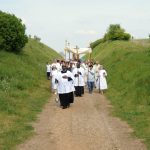
Phil McCarthy is the man behind Pilgrim Ways – a digital resource that provides walking routes to key pilgrimage sites in each of our dioceses. An author, and former CEO of the Caritas Social Action Network, he has created a ‘pilgrim way’ for each diocese – from the cathedral of that diocese to one or more of its shrines.
“These are routes are not just for Catholics to deepen their faith,” says Phil. “They’re for everyone to experience pilgrimage within a Catholic setting.”
The Pilgrim Ways website offers a number of resources to assist in preparing for a walking pilgrimage. It has an interactive map, provides GPX files for the routes that can be downloaded to mobile phones, and there are ‘Pilgrim Passports’ that you can get stamped along the way, not to mention certificates at the end to show that you’ve completed the walk.
Interestingly, the title for the project is Hearts in Search of God, and is inspired by a quotation from Pope Francis where he reminds us that in every pilgrim beats a heart in search of God – whether old or young, sick or in good health, or just a casual tourist.
Visit pilgrimways.org.uk to access the routes and resources. Our interview with Phil McCarthy was first broadcast in our Summer 2023 ‘At the Foot of the Cross‘ podcast.
You can subscribe to our Catholic News podcasts via Apple Podcasts, Amazon/Audible or Spotify.
2nd June 2023
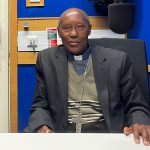
In this Catholic News podcast, we’re joined by Bishop Peter Kihara Kariuki, Bishop of Marsabit, and Isacko Jirma, Director of Caritas Marsabit.
Marsabit is a semi-arid location 500km north of the capital of Kenya, Nairobi. The local Catholic diocese spans almost 80,000 square kilometres without a single river passing through.
The Horn and East Africa has suffered its worst drought in 40 years. In Marsabit, where 80% of people rely on livestock for their income, their animals have died and their crops have failed.
Bishop Paul and Isacko discuss the pastoral challenges and the social action projects needed to help more than 300,000 people escape food insecurity.
You can subscribe to our Catholic News podcasts via Apple Podcasts, Amazon/Audible or Spotify.
25th May 2023

Rachel’s Vineyard is a healing ministry for those who are suffering from the trauma of abortion, or have been closely connected to someone who is – whether they’re siblings, grandparents, aunts, cousins. Rachel’s Vineyard recognises that abortion impacts the wider family and community. The organisation also supports those that have worked in the abortion industry and struggle with the part they have played in abortion decisions.
Rachel Mckenzie is the director of the Birmingham-based charity and spoke to us back in June 2022 about the ministry and the growing numbers of people seeking help:
“I tell them firstly that they’re not alone and that they are already loved, and they can get forgiveness, they haven’t committed the unforgivable sin and they just need a place where they can work through that pain and be supported along the way.”
Post abortion trauma is central to the theme of Day for Life 2023.
You can subscribe to our Catholic News podcasts via Apple Podcasts, Amazon/Audible or Spotify.
25th May 2023
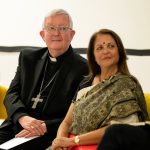
Recently, Archbishop Bernard Longley was a keynote speaker at a unique interfaith event that examined how followers of the world’s major religions viewed eternity, and how a knowledge of eternity can help us to make the most of the life that we have now.
Organised by The Centre for the Art of Dying Well and the Institute for Theology and Liberal Arts at St Mary’s University, the Archbishop of Birmingham gave the Christian perspective, explaining that “the starting point for understanding eternity is in our relationship with the person of Jesus Christ – God’s eternal son.
“We believe through his life, his death and the resurrection – his rising form the dead that grace by grace, God has shared with humanity the fruits of eternal life.”
In the Catholic tradition, at the moment of death, the Archbishop said that: “prayers are offered which not only bring comfort and consolation to the departing soul, but also give reassurances of life – that life which is to come at the end of this earthly life.”
The five other main speakers alongside Archbishop Longley were: Rabbi Yossi Jacobs, The Chief Minister of the Birmingham Hebrew Congregation, Singers Hill Synagogue; Simon Romer, Teacher of Buddhism; Anjana Shelat, Midland region coordinator of Hindu Mandir Network UK, Trustee at Shree Laxmi Narayan Temple; Dr. Gopinder Sagoo, from the Guru Nanak Nishkam Sewa Jatha community in Birmingham, and Mohammad Asad MBE, lead Imam at Birmingham Central Mosque.
This Catholic News podcast carries an interview with Archbishop Longley recorded a few days before the event. Use the embeded player at the top of this page to listen or use the subscribe links below.
It was part of the bi-monthly ‘Art of Dying Well’ podcast. Listen here.
You can subscribe to our Catholic News podcasts via Apple Podcasts, Amazon/Audible or Spotify.
18th May 2023
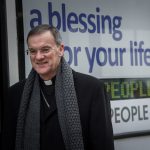
To mark the 57th World Communications Day, this Catholic News podcast looks at Pope Francis’ message for the day and the challenges of emerging technologies with Bishop John Arnold.
Bishop Arnold is the Lead Bishop for Communications for the Bishops’ Conference.
As well as discussing the theme for World Communications Day, Speaking with the heart. ‘The truth in love’, we also discuss the need to embrace emerging technologies with an ethical mind, to ensure human beings don’t suffer on the path to ‘progress’.
World Communications Day is celebrated in the parishes of England and Wales on Sunday, 21 May 2023.
You can subscribe to our Catholic News podcasts via Apple Podcasts, Amazon/Audible or Spotify.
12th May 2023
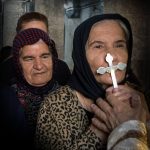
Sunday 14 May, the Sixth Sunday of Easter, marks the International Day of Prayer for Eastern Christians.
It’s an opportunity to come together to pray for peace in the world – especially in the Middle East. But with so many noble causes competing for our attention, why is it important for us to pray for the Christians of the East with whom we share an indelible link?
And how can we find out more about these Christian communities and the challenges they face? That’s the subject of this Catholic News podcast.
We’re joined by Dr Harry Hagopian, an International Lawyer with experience in conflict resolution and a consultant on the Middle East North Africa region. Importantly, Harry is an Armenian Christian and was a former Assistant General Secretary of the Middle East Council of Churches.
“When we pray for the Christians of the East, what we should say is, ‘May thy will be done’ and ‘thy will’ is also the will of the Christians there. They are a self-sustaining community. They have their own problems, they have their own challenges, but they also know their solutions better than we do sitting in the West watching EastEnders or Coronation Street advising them what they should or shouldn’t do. That is not being in solidarity. That is religious colonialism.
“What we need to say is, ‘I’m with you. We share one common thing, which is Jesus Christ, and therefore I pray so that you have the will, the power and the strength to continue your witness and do what you do, which is continue your life as we do here, but in different circumstances.'”
You can subscribe to our Catholic News podcasts via Apple Podcasts, Amazon/Audible or Spotify.
8th May 2023

Speaking to us shortly after Sunday Mass the day after the Coronation of Their Majesties King Charles and Queen Camilla, Cardinal Vincent Nichols looks back on a day of celebration that showcased plenty of elements familiar to Catholics.
Six Catholic prelates attended the historic coronation, including the Cardinal Secretary of State and the Apostolic Nuncio representing the Holy See, and Cardinal Nichols himself who conferred a blessing on King Charles.
The Cardinal prayed that God may pour upon the King “the riches of his grace, keep you in his holy fear, prepare you for a happy eternity, and receive you at the last into immortal glory.”
On this ‘Catholic News’ podcast, Cardinal Nichols reflects on a remarkable and historic occasion, talking about his role, the Catholic elements of the service, not least the Coronation Choir singing William Byrd’s ‘Gloria in Excelsis Deo’ from the Mass for Four Voices, and why we should pray for the King.
You can subscribe to our Catholic News podcasts via Apple Podcasts, Amazon/Audible or Spotify.